Photographs: Haresh Pandya Haresh Pandya
Arvind Pujara, in conversation with Haresh Pandya, discusses the rise of his son, Indian cricket's new star Cheteshwar.
I'm obviously a proud father. But only I know how hard and sincerely my son Cheteshwar, whom we affectionately call Chintu, has strove to reach where he is today.
Doubtless, he had some potential to become a cricketer. But being a first-class cricketer myself, I know very well that mere potential or talent doesn't take you anywhere or far enough.
You've first to sharpen your skills and then form a habit of translating them into sterling performances.
It's a long process, but the fruits are tasty.
Chintu being our only child, my wife Reena and I were particularly careful about his development. It isn't that we forced him to become a cricketer. No!
The fact is I could see genuine talent for cricket in him when he was barely four or five. His stance, his manner of wielding the small bat and his hand-eye coordination pleasantly surprised me.
Also, his balance, his movement of the feet and his use of the toes while flicking or glancing the ball at such a tender age made me feel that if I worked on his batting, he could become a good batsman.
I began to help Chintu practise first with a rubber ball and then with a hard ball at the Railway ground, which was only a few metres from the quarters my employers, the Railways, had provided me, both in the morning and evening.
He was only a kid and I didn't want the ball to bounce above knee height lest it might injure him. So I would bowl underarm at him -- about 50, 60 balls in the morning and another 50, 60 in the evening. He was so keen to bat that he would ask for more.
...
'Ghavri told me to concentrate on Chintu's batting'
Image: Cheteshwar Pujara's proud dad, Arvind PujaraSeeing us practice regularly, other kids also started joining in. Chintu would play each ball on merit. I used to guide him whenever he played wrongly or made mistakes.
I could see that within a few days Chintu grew in confidence and some of the shots he executed were really incredible.
After a few days I began making him bowl and field as more and more boys joined us. To my surprise, Chintu bowled fastish leg-spin. I found his bowling just about as good as his batting.
Within a couple of years Chintu was emerging as an all-rounder. Being a father, I naturally began to see great cricketing talent in him. But I realised it was a father's opinion, which could be subjective or biased; or both.
So I decided to consult my friend, former India all-rounder Karsan Ghavri. He asked me to meet him in Mumbai along with Chintu. We immediately set off for Mumbai by train.
Ghavri made Chintu bat and bowl at the BPCL (Bharat Petroleum Corporation Limited) ground for nearly three hours.
Impressed, Ghavri told me to concentrate on Chintu's batting and predicted that he would play for India one day. I, too, always felt that Chintu was a better batsman than bowler and Ghavri's word convinced me further.
Batting in front of someone like Ghavri and interacting with him not only made Chintu very happy, but also gave him new found confidence. He began to bat with new vigour, new zeal and would tell the boys at my camp to bowl more and more at him.
...
'We'd spend vacations in Mumbai to help him develop his cricketing skills'
Image: Cheteshwar PujaraI soon realised that Chintu was hardly getting to bat against decent pace bowlers, not just in the camp, but also in his school and other matches. And he wasn't getting to play more matches either.
I strongly feel that match practice is a must for anyone. Chintu was about 10 years old when my wife and I decided to spend his summer and winter vacations in Mumbai for the development of our son's cricket.
It would serve two purposes -- Chintu would get to bat against quality fast bowlers and also have sufficient match practice.
But it wasn't easy. Being a humble government employee, I was always hard-pressed for money even though there were only three members in our family.
We had no other source of income. But we were prepared to sacrifice anything, including my wife's savings, for our son.
Accommodation in Mumbai was a major problem. Initially we stayed in an under-construction building in Rabale in Thane district, where life was full of hardships, particularly for my wife, who had a tough time fetching water and washing clothes.
The best part was that Chintu was getting match practice in Mumbai, though he had to travel a lot, both by bus and train. My wife and I used to accompany him to matches and would watch the action from the boundary.
Karsan Ghavri helped us immensely those days. He helped Chintu turn out for the former Mumbai left-arm spinner Ravi Thakkar's club in Matunga. Why, Thakkar even helped us get accommodation in Mulund (northeast Mumbai)!
...
'Living in Mumbai toughened Chintu as a cricketer'
Image: Cheteshwar PujaraAnother person who helped us a great deal in Mumbai was Ramesh Kasbekar, an IOC (Indian Oil Corporation) official. He had seen Chintu in my camp when he was posted in Rajkot.
He was very impressed by Chintu's batting and had predicted a bright future for him. I had coached Kasbekar's son in my camp. He, too, helped us with a place to live in at Panvel (a township in Navi Mumbai).
But for timely help by Ghavri, Thakkar and Kasbekar, life would have been miserable for us in Mumbai.
In Mumbai, Chintu used to play about three matches a week and 12 games a month. During our two-month stay in Mumbai he used to play 20-odd matches, which was more than we had bargained for.
After all, in Rajkot he didn't get to play even 20 matches in a whole year!
In Mumbai, where we went for three years, Chintu played the maximum number of his inter-club and inter-camp matches in Dadar (central Mumbai).
Living, travelling and playing in Mumbai toughened Chintu as a cricketer. He learned to adjust himself to situations. Importantly, it added the much-needed competitive edge to his overall cricket.
Playing in Mumbai changed his entire approach to cricket.
All this became apparent when he was selected in the Saurashtra Under-14 team, when he scored back-to-back centuries -- 138 against Mumbai and 306 not out versus Baroda in 2000-01.
In many ways, the 306 not out turned out to be a turning point in his career. Not only did it earn him national headlines for the first time; his progress as a cricketer has been marked since then.
People began to notice him, recognise him and even started predicting a great future for him.
While all that was good and complimentary, I kept telling Chintu during his teenage years to always keep a level head and never allow success and fame to get the better of him.
...
'Once he is selected in the Indian team, he will be unstoppable'
Image: Arvind Pujara says, 'It's from his mother Reena that Chintu has learned important lessons about life like honesty, sincerity, punctuality, discipline and even spirituality'People often ask me what Chintu would have become if not a cricketer.
Well, the truth is he climbed the cricket ladder at a very early age and now he is so successful in his chosen field, that we've hardly had time to think about another career option for him.
Since he was a brilliant student, I've no hesitation in saying that he would have become a doctor, or an engineer or an executive. He could have excelled in any profession.
Though he doesn't have any time for studies now, he is very keen on completing at least his graduation.
Of course, I've taught him the ABC of cricket. We still discuss his cricket, his technical flaws, his failures, his success and many other things besides whenever we're together; or on the phone when he is away playing or touring.
He has had an inborn talent for cricket and I really can't take much credit for what he is and where he has reached today.
Maybe he was already like a rough diamond and I've polished him a bit.
It's from his mother Reena that Chintu has learned important lessons about life like honesty, sincerity, punctuality, discipline and even spirituality, which have always stood him in good stead as a cricketer.
Like me, she wanted Chintu to become a cricketer. But it was her dream that he play for India and bring laurels to the country.
In fact, she seemed to have more confidence in his ability than probably Chintu himself. I still remember her telling me: "Once he is selected in the Indian team, he will be unstoppable."
...
'Reena's death made Chintu more determined'
Image: Cheteshwar PujaraBut cricket isn't all about technique. It calls for many other qualities too.
Reena wanted to make him a better human being first. She has inculcated certain basic values in Chintu. She was extremely religious and it is from her that Chintu has learned the importance of performing puja and saying daily prayers.
She always told Chintu that puja and prayer make one mentally tough and give peace of mind.
These are vital virtues for a cricketer, though not many possess them. You can see them in Chintu's ability to excel under pressure.
She took utmost care of Chintu and looked after him without ever pampering him. She would ensure that Chintu went to bed early and got up early in the morning. She further ensured that Chintu took his simple, but healthy and nutritious food, and milk on time.
She had made it mandatory for him to drink a glass of coconut juice daily after his cricket practice.
Being almost obsessed about cricket, Chintu himself was never obstinate about anything, not even fancy toys and other luxuries. Playing cricket was everything for him right from his childhood.
There was tremendous attachment between the mother and the son. On his part, Chintu had promised her that one day he would fulfill her dream.
But fate had other ideas. She was diagnosed with cancer and succumbed to the dreaded disease in October 2005 when Chintu was returning after playing a match in Bhavnagar.
Just an hour before her death she had told me we would go to receive Chintu at the bus station. But suddenly she developed acute pain and uneasiness. I was out buying medicine for her when I got the news that she breathed her last.
It was very sad that neither Chintu nor I was by her side when she passed away. You can imagine what a huge shock it must have been for Chintu when he was told about his mother's death.
We were really worried about him, especially when he barely uttered a few words, let alone shed tears, for several days. It was as if his world had collapsed.
Reena's death made Chintu more determined, and if you look at his scores and performances post-2005, you can notice a remarkable degree of consistency in them.
He was so close to his mother and he loved her so much that I was certain he wouldn't rest content till he got the India cap.
...
'Injuries haven't disheartened him'
Image: Cheteshwar PujaraHe knew it would be his best possible tribute to his mother, the fulfillment of her long-cherished dream.
Though she isn't alive to see where her son has reached today, I am sure she must be blessing him from wherever she is.
If there is any other person Chintu is more attached to after his mother, it is his spiritual guru, Hariprasadji Maharaj from Gondal near Rajkot.
He has known Chintu since he was a baby and his blessings mean so much for my son.
Chintu has recently been engaged to a Rajkot girl, Puja Pabari, who belongs to our Lohana community. Hariprasadji Maharaj has blessed the couple. Chintu and Puja make a nice pair.
After Reena's death I always felt that Chintu needed some emotional support. It is from his mother and his wife that a man gets emotional support.
Moreover, I also have health problems. I underwent open heart surgery last year which lasted six hours. Chintu was with me at the time as he was recuperating from his injury, which resulted in him missing three important Test tours -- to the West Indies, to England and to Australia.
He has suffered serious heart-breaking knee injuries, not only once but twice. Isn't it strange that on both occasions he was fielding? His steely resolve helped him come out successfully from those injuries.
It wasn't easy though. But he religiously followed the instructions of his doctors and exercised regularly.
Never once did I see him disheartened. Even when I was recovering after heart surgery, he had been encouraging me, giving me himmat (courage).

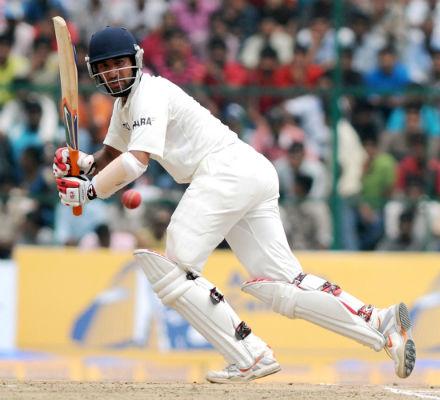
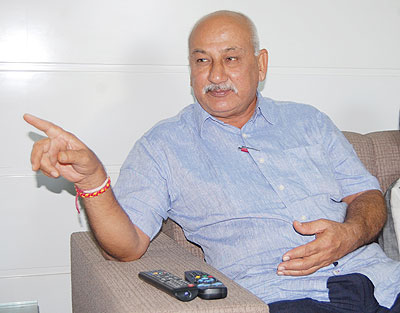
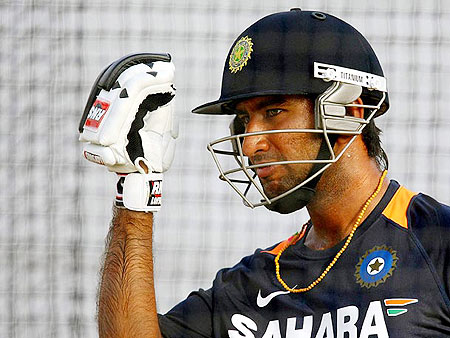
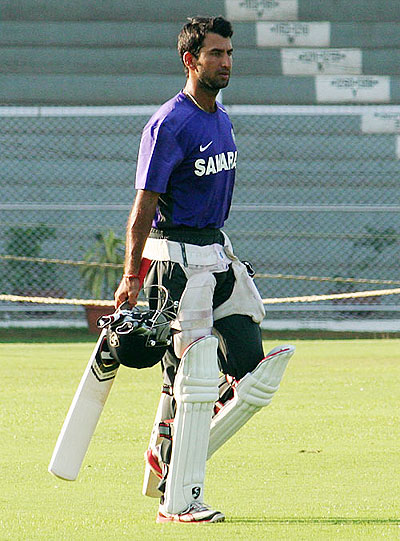

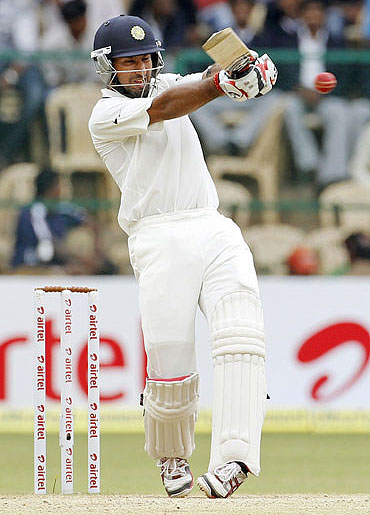
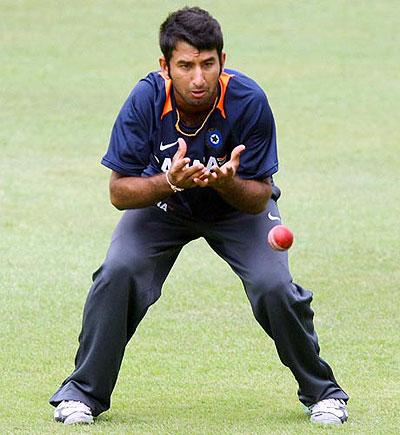
Comment
article